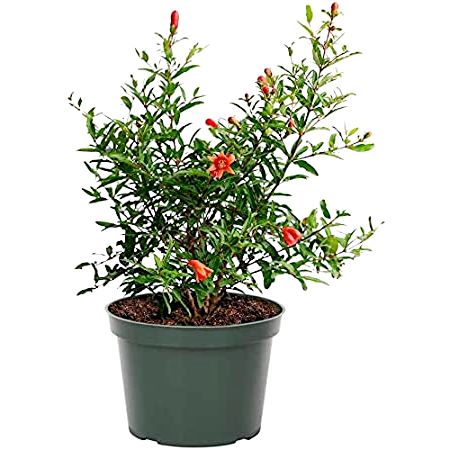
Ornamental Pomegranates
Pomegranates grow on fairly small trees that could even be classed as shrubs. They rarely grow taller than 10 feet. The fruit is very unique and though it is commonly eaten fresh, it’s a bit difficult to enjoy that way. Inside the thick tough rind are a large number of little juice-filled “berries†inside, each with a little seed inside. The juice will stain, so it can be a challenge to get the edible bits out of the fruit without making a mess. Pomegranate juice is currently very popular for it’s healthy qualities.
The juice is high in vitamin C, potassium and vitamin B5, as well as a number of antioxidants that have a long list of health benefits. If you eat the small seeds in each “berryâ€, you will also get a dose of fiber.
Tree Care
- If you want your pomegranate to grow in a tree form, you will need to prune the many suckers that sprout up from the base of the trunk. You’ll also want to prune any dead branches each spring to keep your tree healthy. Once you have created a tree form for your plant, it shouldn’t require too much more pruning.
- After about 3 years, you will start to see your tree developing from fruit but it will probably drop most of them before they mature. This is normal for pomegranates, and you won’t start to get a real harvest until around 5 years of age.
- Pomegranates are quite drought-tolerant but during any extended dry periods they should be given a deep watering at least every 3 weeks if necessary. Fertilizer is helpful for the first year or two but after that most trees will do fine without additional nutrients unless you happen to have particularly poor soil. A yearly feeding or even just a dressing of compost or aged manure is enough.
Containers
- Pomegranates work fine in large containers, though you should keep it well trimmed and pruned to a small size. A dwarf variety will thrive the best. When shopping for a dwarf tree, double-check that it will produce fruit. The shrubs have lovely flowers, and many dwarf or potted trees are ornamental only.
- Container plants will need a bit more water than garden-planted ones, but pomegranates will do fine in dry soil so you shouldn’t need to water too frequently.
Pests and Diseases
- There are not a huge number of potential insect pests for pomegranates and they are a very easy tree to grow because of it. Aphids can be a problem, but regular sprays with soapy water can help wash them off and keep them away.
- The pomegranate butterfly is one insect specific to the pomegranate but it’s only common in some regions. The butterfly lays eggs in the flower buds, and the growing larvae will bore into the new fruit to feed. You’ll need to spray your trees once or even twice during the early spring. Once they have moved into the fruit, they are difficult to kill.
- Leaves may develop some spots from various kinds of blight, but none are usually serious with pomegranates. Cut off any infected branches as soon as you see leaf blotching, and you should be fine as long as it hasn’t spread through the entire tree.
- The tough outer rind generally protects the fruit, so birds and other larger pests are not usually a problem except occasionally when the fruit is very young.
FAQs:
What is the Return Policy?
This product is Not Returnable. It may be replaced or refunded in case of damage or defective condition on a case to case basis.
How to cancel my order?
Cancellation for Live Plants is allowed before the dispatched. You can request cancellation through Your Orders page or by contacting customer service within that time.
What if i received damage product?
If a product is received in a damaged or defective condition, you need to contact the customer service within 1 days of delivery. Free of cost replacement or refund claim is available to you.


